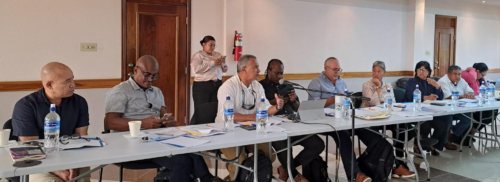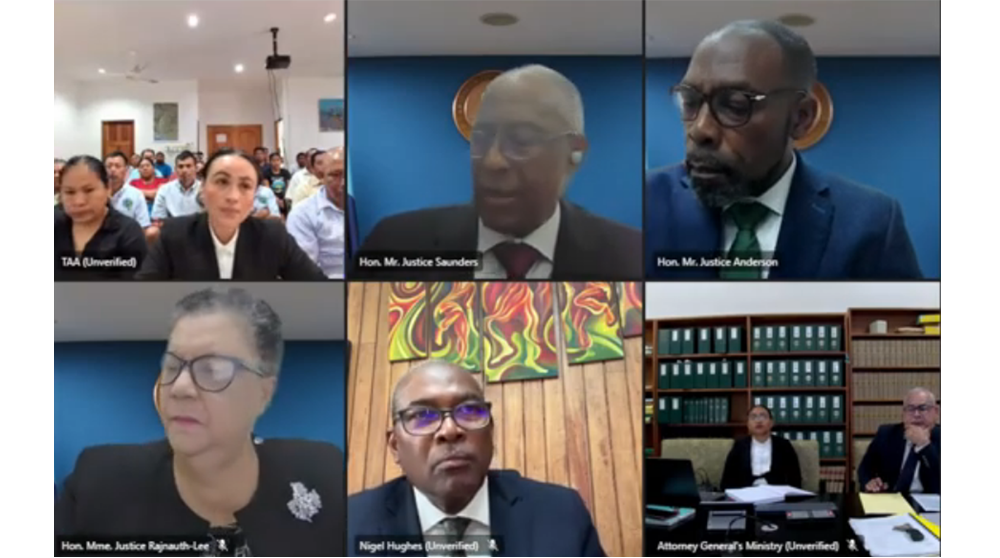Photo: CCJ Maya Land Rights case compliance hearing – May 16, 2024
TOLEDO DISTRICT, Thurs. May 16, 2024
At the latest Caribbean Court of Justice (CCJ) compliance hearing for the Maya Land Rights case, the two parties reported significant progress in relation to the implementation process of the Court’s April 2015 Consent Order. The Court, through Justice Winston Anderson, highly commended both parties for what he described as “one of the most positive set of reports we have had since we started the monitoring process.”
Senior Counsel Andrew Marshalleck, one of the attorneys who represents the Government of Belize, described it as a very busy few months since the last compliance hearing at the end of November 2023. Though it had been agreed back then that the last draft of the Maya Customary Land Tenure Policy was to go to a draftsperson by mid-January this year, Marshalleck reported that there was such strong and vociferous objection to the concentric circles proposal for village boundary delimitation that the draft was submitted to further consultation. Thereafter, a further draft was proposed, and then a high-level meeting of government ministers and the appellants followed on May 9 to discuss issues of concern. With both sides coming out of that meeting with great optimism, Marshalleck told the CCJ that they are now moving closer to some common ground. However, he believes there won’t be complete agreement on all matters.

Photo: High level meeting with appellants in Maya Land Rights case on May 9, 2024
The latest boundary delimitation proposal is that villages will each submit an application for a given space, but they must provide evidence that they have had use and occupation of the land for a given number of years (a threshold). The parties must now discuss the length of that threshold. We are told that the Government is proposing 30 years. In the meantime, after considering the names of several persons, the Government has already approved that a draftsperson be engaged and their appointment could be done by the end of June. Drafting of the bill that will give effect to the policy could take anywhere between two and three months, and the Court reminded the parties of their aim to have concluded the implementation of the Consent Order within a decade – that is, by April 2025.
Leslie Mendez, one of the attorneys who represents the appellants, i.e., the Maya Leaders Alliance (MLA) and the Toledo Alcaldes Association (TAA), remarked that “there have been notable improvements in the communication and dealings” with the Government, and she expressed that the appellants are optimistic that the policy could be finalized soon. Mendez also indicated that the two sides agreed to conduct consultations as the bill is being drafted. Meanwhile, the MLA and TAA undertook to provide to the Government a further proposal on demarcation of village boundaries by the end of this week. The Government must respond two weeks after.
During the monitoring hearing, Marshalleck also highlighted a concern of the Government that two villages (out of the 41 that the case encompasses) have been issuing “homemade titles to land.” He asked for restraint “in that kind of activity,” saying he believes it can derail the consultation process. According to Marshalleck, the documentation being distributed features a logo and coat of arms of the state. He says this could give the impression that it is some “formal documentation, some formal title from the state. And I am afraid it can lead to some unrealistic expectation …” Responding to the concern, Mendez shared that the communities have been distributing residential lots for decades and the certificates are merely a means of formalizing that process. As to the logo, she declared it would be in response to the “sensitivity which the communities would have toward the accusation of balkanization … but the idea is certainly, as I understand it, to ensure that what is being communicated is that this remains Belize and we remain under the jurisdiction of Belize.” Mendez did say that they support a meeting with the Government and the villages to discuss the concern. After Justice Saunders questioned whether such distribution of homemade titles is premature, given that the auto-delimitation process is not finalized, Mendez argued that the communities should be allowed to continue living their lives, and noted that the certificates are for lots where there is already construction. She did accept that the concern is applicable to areas in dispute. Justice Adrian Saunders highlighted a concern of there being competing titles with those from the Government.
On the matter of the Yemeri and Laguna boundary differences, Mendez also reported that there have not been any more flare-ups since the last compliance hearing, and all parties expressed relief about this. However, the Government and the appellants are still working out the signing of an MOU with the two villages. Marshalleck reported that Yemeri has changed representation, and that the comments from the new legal counsel have moved the sides further from agreement. Mendez said what they intend to do along with Laguna is to remove superfluous language from the draft MOU and leave a bare bones interim measure that captures the basics.
The Court also asked for an update regarding Indian Creek, where there was a difference of views regarding the removal of the Alcalde. While the matter is being challenged in court, Mendez says the villagers are concerned about rangers preventing them from moving around and accessing resources in the village. Marshalleck highlighted that the rangers are working for a private entity, and said he supports moving the parties toward signing an MOU, similar to the efforts at intervention in relation to Yemeri and Laguna.
The next compliance hearing of the CCJ is set for Thursday, October 10, 2024.

